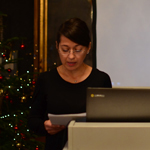Euroacademia Conferences
 Europe Inside-Out: Europe and Europeanness Exposed to Plural Observers (9th Edition) April 24 - 25, 2020
Europe Inside-Out: Europe and Europeanness Exposed to Plural Observers (9th Edition) April 24 - 25, 2020 Identities and Identifications: Politicized Uses of Collective Identities (9th Edition) June 12 - 13, 2020
Identities and Identifications: Politicized Uses of Collective Identities (9th Edition) June 12 - 13, 2020 8th Forum of Critical Studies: Asking Big Questions Again January 24 - 25, 2020
8th Forum of Critical Studies: Asking Big Questions Again January 24 - 25, 2020 Re-Inventing Eastern Europe (7th Edition) December 13 - 14, 2019
Re-Inventing Eastern Europe (7th Edition) December 13 - 14, 2019 The European Union and the Politicization of Europe (8th Edition) October 25 - 26, 2019
The European Union and the Politicization of Europe (8th Edition) October 25 - 26, 2019 Identities and Identifications: Politicized Uses of Collective Identities (8th Edition) June 28 - 29, 2019
Identities and Identifications: Politicized Uses of Collective Identities (8th Edition) June 28 - 29, 2019 The European Union and the Politicization of Europe (7th Edition) January 25 - 26, 2019
The European Union and the Politicization of Europe (7th Edition) January 25 - 26, 2019 7th Forum of Critical Studies: Asking Big Questions Again November 23 - 24, 2018
7th Forum of Critical Studies: Asking Big Questions Again November 23 - 24, 2018 Europe Inside-Out: Europe and Europeanness Exposed to Plural Observers (8th Edition) September 28 - 30, 2018
Europe Inside-Out: Europe and Europeanness Exposed to Plural Observers (8th Edition) September 28 - 30, 2018 Identities and Identifications: Politicized Uses of Collective Identities (7th Edition) June 14 - 15, 2018
Identities and Identifications: Politicized Uses of Collective Identities (7th Edition) June 14 - 15, 2018
Hybrid Modes of Collaborations in Contemporary Art Practices: Challenging the Politics of Belonging in the Post-1989 Community
-
-

-
Presentation speakers
- Izabel Galliera , Department of History of Art and Architecture, University of Pittsburgh, USA
- Download presentation
Abstract:
This paper problematizes the notion of community enacted at the EU level, through a contextual analysis of two collaborative contemporary artworks, Re:route (2002, in Turin, Italy) by the Hungarian artist Miklos Erhardt and Scottish artist Dominic Hislop and Together/Impreuna (2007, in London, UK) by Romanian artist Matei Bejenaru. I argue that such art projects through their hybrid modes of collaboration based upon a contestational approach to social capital, propose alternative views to a pan-European space with its generally positive notions of belonging and European Citizenship. In contrast to a consensual notion of community among individuals and groups bound together, for instance, by shared norms and interests, I argue these artists, in different ways, utilize the mechanics of social capital as effective resources to engage politically and socially marginalized groups in collective action in order to ultimately inspire an inclusive form of community that embraces dissension and difference. -
Related Presentations

Black and White: Imaginations of European Identity in Eurosceptic and Eurooptimistic Political Cartoons in UK and Slovakia
- Daniela Chalaniova
















